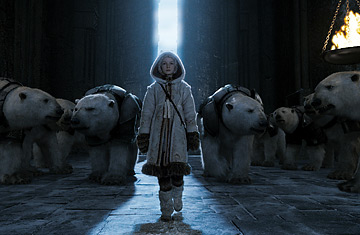
The Golden Compass
"So... how blasphemous was it?" That's not a question movie studios want on an exit poll for audiences coming out of a big weekend family fantasy movie that owes more to J.R.R. Tolkien and J.K. Rowling than it does to Christopher Hitchens and Aleister Crowley. Yet, because of a controversy stoked by religionists, atheists and editorial writers, the issue hovers over The Golden Compass like the witches that soar across the film's Arctic sky.
Director-screenwriter Chris Weitz's film version of the first book in Philip Pullman's His Dark Materials trilogy is meant to be a blockbuster for all major moviegoing demographics, from six to 16. Wreathed in lavish CGI effects, The Golden Compass traces the quest of the 12-year-old Lyra (Dakota Blue Richards) to find a missing friend and, eventually, to save her world. On the way to her destiny she's imprisoned by a glamorous vamp (Nicole Kidman), befriended by a talking polar bear (the talking is done by Ian McKellen) and accompanied by her own Jiminy Cricket — a cute, shape-shifting creature who speaks in the cheerfully urgent voice of Freddy Highmore (Charlie in Charlie and the Chocolate Factory).
This creature and his fellows are the consciences, the very souls, of the humans they're attached to. Yet they're called "daemons"; and that's the first hint of Pullman's agenda. As the trilogy progresses the author reveals a battle between a dictatorial deity and the rebel angels determined to defeat Him. God is the villain of the piece, Satan the hero. And Lyra's on the side of the devils. As Pullman said to the Sydney Morning Post, "My books are about killing God."
The theological impudence of His Dark Materials didn't stop it from selling 15 million copies worldwide. In Britain the trilogy was a phenomenon, spawning a radio adaptation and a six-hour play at the National Theatre that sold out its run before it officially opened. The story's anti-theology had little to do with its success, or with impeding it. People of all ages love a ripping yarn, which this is; and The Lord of the Rings had established an appetite for multi-volume fantasy novels. (The trilogy's initial book, called Northern Lights in the U.K. and The Golden Compass in the U.S., was published two years before the first of the Harry Potter books came out.)
So New Line Cinema, flush from the surprise megahit status of the first Lord of the Rings film, bought the rights to the Pullman saga — and promptly started fretting about the God problem. Retain the books' central conflict, and stoke the wrath of America's Christian Right. Delete it, and risk alienating Pullman's fan base, which is not so large here as in Britain. (The books had already been slightly redacted in their U.S. editions, which cut passages about Lyra's budding sexuality.)
No one ever accused Hollywood of having guts. American movies have routinely made mock of priests and ministers, but in R-rated comedies and miniature indie dramas. Yet when the notion is raised of being faithful to a popular fantasy series that takes a caustic view of organized religion, the moguls become as cautious and pious as Republican presidential candidates.
In his Afterword to Lolita, Vladimir Nabokov wrote that one of the subjects taboo to American publishers was that of "the total atheist who lives a happy and useful life, and dies in his sleep at the age of 106." New Line, having invested something like $180 million in The Golden Compass, is similarly scared of its antireligious content. The company that boldly greenlighted Peter Jackson's $300 million Hobbit ambitions before a frame of the first movie was shot, and made billions from riding that risk, hasn't said yes to films two and three of the Pullman books — although the first movie ends with a chatty preview of the plot in the sequels, should they ever be made. For now, viewers will have to take that on faith.
As for the answer to that leading question about blasphemy in The Golden Compass, it would be a resounding "Huh?" If moviegoers are unaware of the Is-God-Bad? debate, they simply will not notice any theological elements, pro or con. That's how rigorously Weitz has secularized and sanitized the novel. Pullman's conception of the Magisterium, the ecclesiastical hierarchy that kidnaps and tortures children (it wants to separate kids from their "daemons," their very essences), is now an oppressive but vague dictatorship that is part Orwell's 1984, part Star Wars' Empire. Weitz also excised the last three chapters of the first book, where the Church's nefariousness is made explicit. Referring to the filmmakers, Pullman told the Atlantic Monthly, "They do know where to put the theology, and that's off the film."
Yet the movie still cued protests from the Catholic League, whose leader, the ever-belligerent William Donahue, said that even if the film isn't heretical, it will lead children to read the books, which are. Donahue might consider that Pullman is no more incensed by the misuse of religious authority than was the preacher for whom Christianity was named — the firebrand who tossed the money changers out of the temple, and condemned Pharisees for distorting God's word.
Someone just asked me if this was a movie review, and, if so, when will it begin? Right now. It's a decent, if familiar, fantasy with a glorious visual design: a lovely jumble of Victorian buildings, sleekly modern costumes and Jules Vernean spaceships. The film's climactic battle, between two imposing CGI ice bears, is a literal jaw-dropper. And its two lead performances made me hope there will be sequels — even if Weitz can't infuse this first episode with the animating spark of grand-scale moviemaking.
